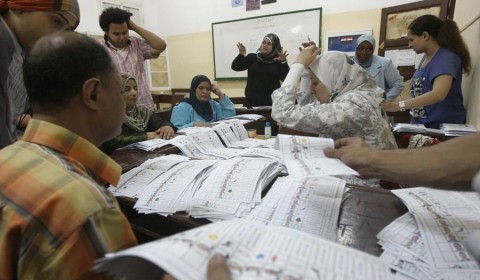With a discombobulating mix of blonde hair and ecstatic cries of “Allah, Allah! , the members of Islamic band Debu sway on stage at a strip mall on the edge of Indonesia’s capital.
Led by a clutch of American siblings, the band of adherents of Sufi Islamic mysticism have become a perennial hit during the holy month of Ramadan here in the world’s largest Muslim-majority country.
The band – who live communally under the tutelage of a 60-something California-born Sufi teacher in Jakarta’s southern sprawl – make an often confusing blur of the lines between the West and Islam.
A tour of Iran last year netted the band wildly popular TV appearances and an audience with President Mahmoud Ahmedinejad, though bureaucratic red tape over their US passports meant they were unable to perform live.
“One of the things that totally blows them out of the water is that, okay, there are these Americans and the women are all in hijabs (head scarves), singing in Indonesian, lead singer Mustafa Daood, a 28-year-old with an American accent and a blonde ponytail, told AFP.
“Or in Turkey we’re singing in Turkish, from Indonesia, so they have no idea where to put us, Daood said, laughing.
Asked what Ahmedinejad was like, Daood hesitated before saying that in their brief meeting the leader reviled as a bogeyman in much of the West seemed to be a “really sweet person.
Debu, whose name means “dust in the Indonesian language, formed in 2001 and play instruments ranging from the oud, a type of Middle Eastern lute, to tabla drums, flamenco guitar and electric bass.
That sound has seen the band sell around 200,000 albums in Indonesia and win their own daily show on national television before evening prayers during Ramadan, Daood said.
But while the 12-member band – which includes Indonesians and one Briton – sings about religious themes, it is cautious over being labeled religious.
Singing in nine languages including Indonesian, English, Arabic, Spanish, Turkish and Persian, the band says it is not about an Islam of dour moralizing.
“‘Religious’ is like ‘oh, you need to pray five times a day, you need to…’, Daood said, trailing off, “these are basic things that they teach kids in pre-school – you don’t need to sing about these things anymore.
“We try to reach them on a much deeper level, on a meaning level, as opposed to just a kind of ritualistic Islam.
“We have one of our songs which says: ‘If my path and my religion doesn’t fill this heart of mine with honey and illumination, I don’t want to waste my time.
Boxing it up
Before the band, Debu members say, there was the Shaykh.
Shaykh Fattaah is a bearded Californian who converted to Islam in his 30s and turned teacher in the esoteric ways of Sufism, a broad set of Islamic disciplines that aims to bring people to a closer experience of God.
The band, which includes four of the Shaykh’s children, is just part of a community that has followed him around the world.
The group of around 60 people moved from homes and trailers in the US state of New Mexico to the Dominican Republic and then, in a move they say was directly inspired by God, to Indonesia.
The group now lives in a housing complex at the city’s edge, where families gather together on the tiled floor of the Shaykh’s house to pray, study and eat. Costs are shared communally.
“Most of us are related, many of us. And if we’re not exactly blood related somehow, we’ve been together so long it’s like we consider it family, percussionist Naseem Nahid, 32, said.
Although money can be short, “We just makes things work with what we’ve got and we never go without. We always have a good time, she said.
The Shaykh himself is rarely seen, only occasionally descending from his room for communal meals. His influence instead carries through lyrics written for the band in a poetic style inspired by Sufi masters such as Rumi.
Replete with images of drunkenness and passion – “Your wine of love intoxicates/ This state my mind cannot conceive/ So I can’t differentiate/ Between Adam and his wife Eve – the lyrics may at first seem startlingly un-Islamic.
But the band says it is all firmly within the Sufi tradition and part of efforts to break Islam away from mere ritual.
The spiritual message is also, according to 30-year-old bassist Ali Mujahid, part of the band’s push to go from being a Ramadan act to mainstream, global success.
“(Many Muslims) tend to take ‘Islamic’ and box it up and use it on Fridays and Ramadan, Mujahid said.
“Our message from the music and the message from the poetry is that we want (Islam) to be daily, it’s a daily thing.



